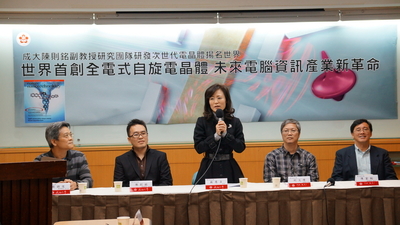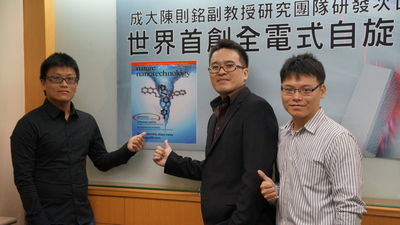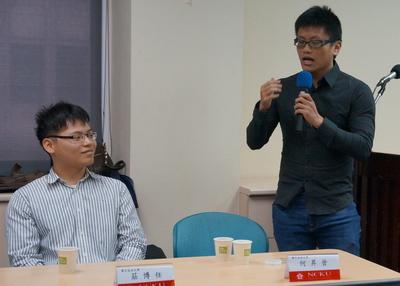NCKU transnational research team develops first all-electric spin transistor



Tainan, Taiwan, February 5, 2015
Scientists have long been puzzled by the spin-field-effect transistor (spin FET) and great efforts have been put into attempt of solving the long challenged problems. Now a Tainan-based National Cheng Kung University (NCKU) research team has successfully developed the first spin FET.
A team led by Prof. Tse-Ming Chen from the Department of Physics at NCKU, in cooperation with Cavendish Laboratory, and University College of London in UK, has developed an all-electric all-semiconductor spin FET, the university revealed at a press conference in Taipei today.
Prof. Chen said, the spin FET, since envisioned by Datta and Das in 1990, has long been believed to be the solution where Moore’s law fails to deliver.
However, the realization of a functional spin FET has hitherto not been achieved, owing to several technical problems such as the low spin-injection efficiency, the limited spin lifetime, and the phase spread of the accumulated spins, according to Prof. Chen.
He said, “We solved the problems by employing two quantum point contacts as spin injectors and detectors.”
“We exploit two engineering architectures of spin-orbit coupling, the interaction between the electron’s spin and its motion, on the device to electrically inject, manipulate, and detect spins,” he added.
Prof. Chen also explained, The all-electric all-semiconductor characteristics of such a device allow it to be easily compatible with large-scale integrated circuits and hold the most promise for information processing in the post-CMOS era.
Their results published in the January 2015 issue of Nature Nanotechnology with additional introduction in news &views article written by Marc Cahay.
The technology underlying the study is now in the process of applying for a patent, according to Prof. Chen.
Enditem/
Scientists have long been puzzled by the spin-field-effect transistor (spin FET) and great efforts have been put into attempt of solving the long challenged problems. Now a Tainan-based National Cheng Kung University (NCKU) research team has successfully developed the first spin FET.
A team led by Prof. Tse-Ming Chen from the Department of Physics at NCKU, in cooperation with Cavendish Laboratory, and University College of London in UK, has developed an all-electric all-semiconductor spin FET, the university revealed at a press conference in Taipei today.
Prof. Chen said, the spin FET, since envisioned by Datta and Das in 1990, has long been believed to be the solution where Moore’s law fails to deliver.
However, the realization of a functional spin FET has hitherto not been achieved, owing to several technical problems such as the low spin-injection efficiency, the limited spin lifetime, and the phase spread of the accumulated spins, according to Prof. Chen.
He said, “We solved the problems by employing two quantum point contacts as spin injectors and detectors.”
“We exploit two engineering architectures of spin-orbit coupling, the interaction between the electron’s spin and its motion, on the device to electrically inject, manipulate, and detect spins,” he added.
Prof. Chen also explained, The all-electric all-semiconductor characteristics of such a device allow it to be easily compatible with large-scale integrated circuits and hold the most promise for information processing in the post-CMOS era.
Their results published in the January 2015 issue of Nature Nanotechnology with additional introduction in news &views article written by Marc Cahay.
The technology underlying the study is now in the process of applying for a patent, according to Prof. Chen.
Enditem/
Provider:
News Center
Date:
104.02.05



